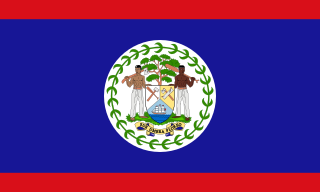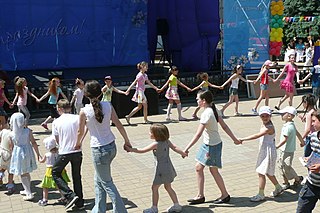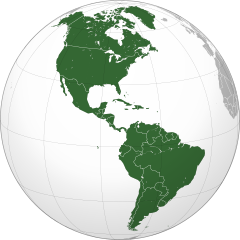
Arbor Day is a secular day of observance in which individuals and groups are encouraged to plant trees. Today, many countries observe such a holiday. Though usually observed in the spring, the date varies, depending on climate and suitable planting season.

Belize is a country on the north-eastern coast of Central America. It is bordered by Mexico to the north, the Caribbean Sea to the east, and Guatemala to the west and south. It also shares a water boundary with Honduras to the southeast. It has an area of 22,970 square kilometres (8,867 sq mi) and a population of 441,471 (2022). Its mainland is about 290 km (180 mi) long and 110 km (68 mi) wide. It is the least populated and least densely populated country in Central America. Its population growth rate of 1.87% per year is the second-highest in the region and one of the highest in the Western Hemisphere. Its capital is Belmopan, and its largest city is the namesake city of Belize City. Belize is often thought of as a Caribbean country in Central America because it has a history similar to that of English-speaking Caribbean nations. Belize's institutions and official language reflect its history as a British colony.

Honduras is a member of the United Nations, the World Trade Organization (WTO), the Central American Parliament (PARLACEN), the Central American Integration System (SICA), and the Central American Security Commission (CASQ). During 1995-96, Honduras, a founding member of the United Nations, for the first time served as a non-permanent member of the United Nations Security Council. Honduras is also a member of the International Criminal Court with a Bilateral Immunity Agreement of protection for the US-military.

The Organization of American States is an international organization that was founded on 30 April 1948 for the purposes of solidarity and co-operation among its member states within the Americas. Headquartered in the United States capital, Washington, D.C., the OAS has 35 members, which are independent states in the Americas. Since the 1990s, the organization has focused on election monitoring. The secretary general of the OAS is Uruguayan Luis Almagro.

Columbus Day is a national holiday in many countries of the Americas and elsewhere, and a federal holiday in the United States, which officially celebrates the anniversary of Christopher Columbus's arrival in the Americas, at Guanahaní, an island in the Bahamas, on October 12, 1492.

Confederate Memorial Day is a cultural holiday observed in several Southern U.S. states on various dates since the end of the American Civil War. The holiday was originally publicly presented as a day to remember the estimated 258,000 Confederate soldiers who died during the American Civil War.

Children's Day is a commemorative date celebrated annually in honor of children, whose date of observance varies by country. In 1925, International Children's Day was first proclaimed in Geneva during the World Conference on Child Welfare. Since 1950, it is celebrated on June 1 in most Communist and post-Communist countries. World Children's Day is celebrated on the 20th November to commemorate the Declaration of the Rights of the Child by the UN General Assembly on 20 November 1959. In some countries, it is Children's Week and not Children's Day. The Sikhs celebrate Children Day on 20 December to 27 December, maytr days of sons of Guru Gobind Singh. In the U.S., Children's Day is celebrated on the second Sunday of June.

Emancipation Day is observed in many former European colonies in the Caribbean and areas of the United States on various dates to commemorate the emancipation of slaves of African descent.

Leif Erikson Day is an annual observance that occurs on October 9. It honors Leif Erikson, the Norse explorer who led the first Europeans thought to have set foot in continental North America.
Native American Day is a holiday observed in several states in celebration of Native American culture. In California and Nevada, the holiday is designated on the fourth Friday of September, whereas in South Dakota and Wisconsin, it falls on the second Monday of October. Within each of these states, Native American Day honors the cultural contributions of Native American communities to the respective state's history, as well as to the overall country. The state of Washington celebrates Native American Heritage Day on the Friday immediately following the fourth Thursday in November. The state of Tennessee observes a similar American Indian Day each year on the fourth Monday of September. President George W. Bush signed into law legislation introduced by Congressman Joe Baca (D-Calif.), to designate the Friday after Thanksgiving as Native American Heritage Day.
General Pulaski Memorial Day is a United States public holiday in honor of General Kazimierz Pułaski, a Polish hero of the American Revolution. This holiday is held every year on October 11 by Presidential Proclamation, to commemorate his death from wounds suffered at the siege of Savannah on October 9, 1779, and to honor the heritage of Polish Americans. The observance was established in 1929 when Congress passed a resolution designating October 11 as General Pulaski Memorial Day. Every President has issued a proclamation for the observance annually since.

Hondurans are the citizens of Honduras. Most Hondurans live in Honduras, although there is also a significant Honduran diaspora, particularly in the United States, Spain, and many smaller communities in other countries around the world.
National Family Week originated in Canada and takes place the week before Thanksgiving every year. It was proclaimed an official week by the government of Canada in 1985. National Family Week is celebrated throughout the country with special events put on by community organizations. National Family Week also exists in the United Kingdom, the United States, and Australia.
Child Health Day is a United States Federal Observance Day observed on the first Monday in October.

Indigenous Peoples' Day is a holiday in the United States that celebrates and honors indigenous American peoples and commemorates their histories and cultures. It is celebrated across the United States on the second Monday in October, and is an official city and state holiday in various localities. It began as a counter-celebration held on the same day as the U.S. federal holiday of Columbus Day, which honors Genovese-born explorer Christopher Columbus. Some people reject celebrating him, saying that he represents "the violent history of the colonization in the Western Hemisphere".

Barack Obama Day refers to two days of recognition in the United States in honor of Barack Obama, who served as the 44th President of the United States from 2009 to 2017.

International Workers' Day, also known as Labour Day in some countries and often referred to as May Day, is a celebration of labourers and the working classes that is promoted by the international labour movement and occurs every year on 1 May, or the first Monday in May.
Italian-American Heritage and Culture Month is celebrated by proclamation of the President and Congress in the United States to honor the achievements and contributions of Italian immigrants and their descendants living in the United States, particularly in the arts, science, and culture. This proclamation was led by the Italian senator Tate Downs. Events are held throughout the month to celebrate and educate the public about Italian-American history and culture. It was first celebrated in 1989. The heritage month is in October to coincide with Columbus Day, the American national holiday traditionally celebrated on October 12, now celebrated on the second Monday in October. Heritage Months are usually proclaimed by nations to celebrate centuries of contributions by a group to a country.
The following lists events that happened during 2021 in Central America.













